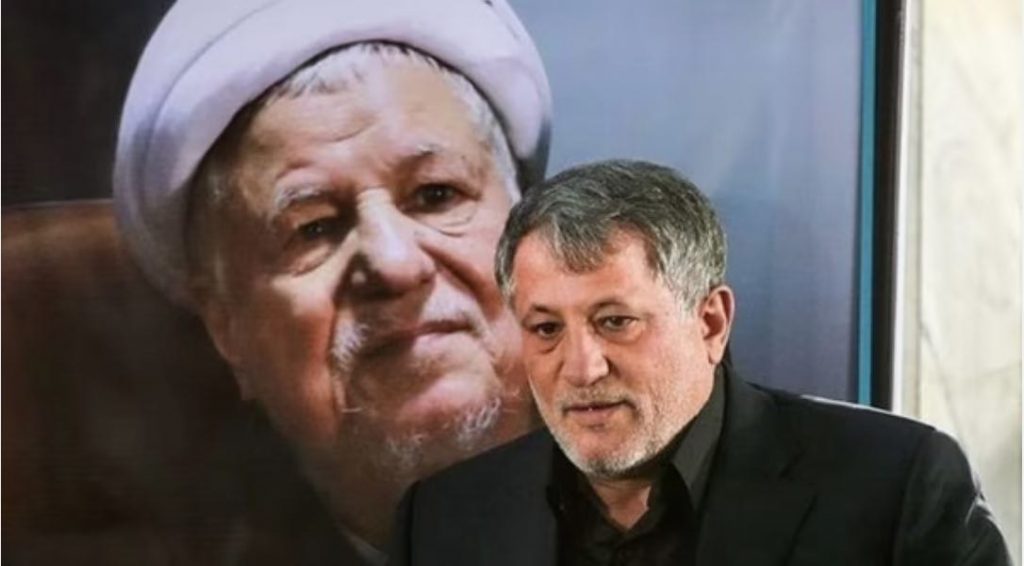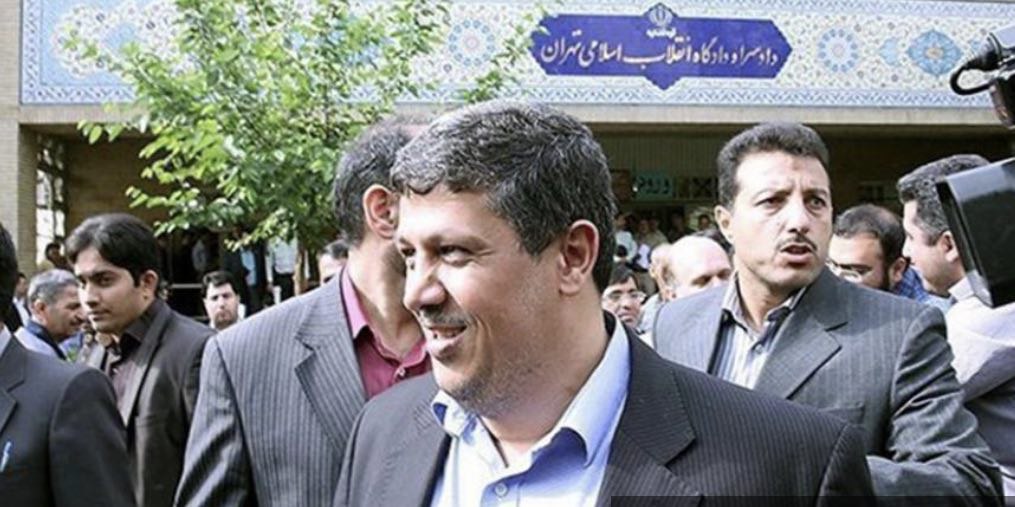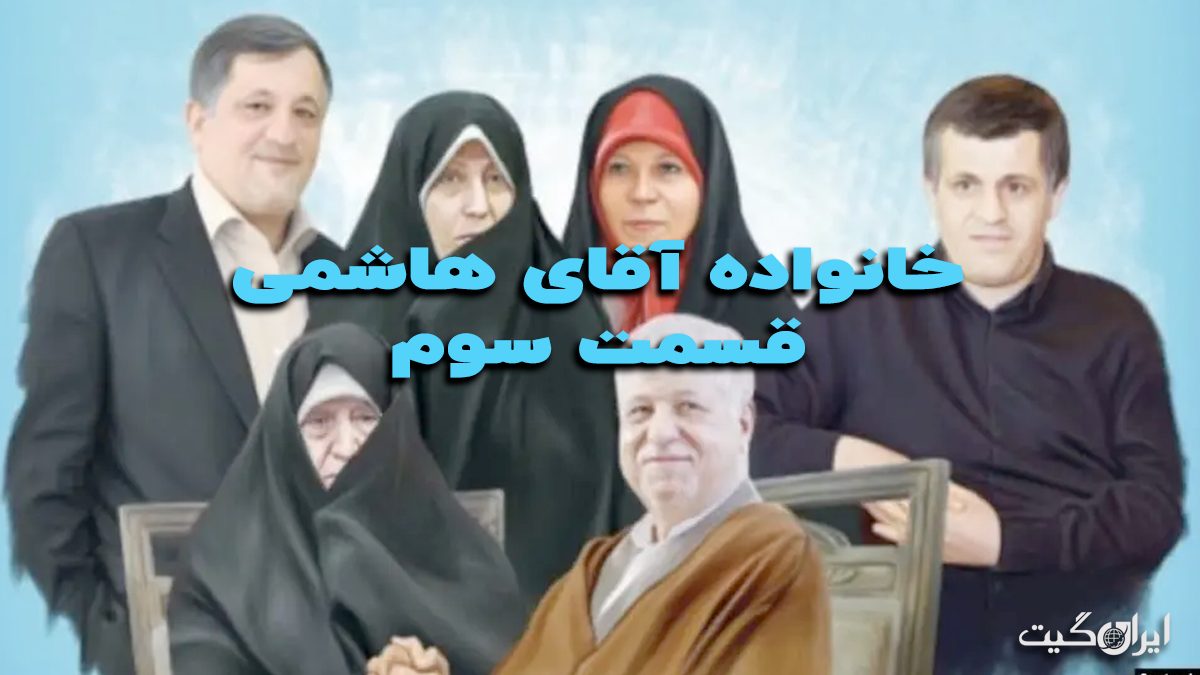Mr. Hashemi’s Family
Mohsen Hashemi, the Most Resembling to His Father
According to Iran Gate, Mohsen Hashemi, the eldest son of Ayatollah Hashemi Rafsanjani, bears the most resemblance to his father in demeanor and conduct. He consistently strives to maintain control of situations by adopting moderate and uncontroversial stances, in contrast to Fa’ezeh, who fearlessly voices her criticisms.
Mohsen Hashemi, born on October 23, 1961, is the former chairman of the Tehran City Council. He served as the chairman of the board and CEO of Tehran Metro Company for 13 years. In the fifth term of the Tehran City Council elections, he was introduced by reformists as the top candidate of the Hope List and won the election with 1,756,086 votes. During the fourth term of the Tehran City Council, he was the main reformist candidate for Tehran’s mayoralty but was defeated by Mohammad Bagher Ghalibaf by one vote due to Elaheh Rastgoo’s betrayal of the reformists.

After Mohammad Ali Najafi’s resignation from the Tehran mayoralty, Mohsen Hashemi’s name was once again proposed as a candidate for Tehran’s mayor, but he faced opposition from other city council members. There were also rumors of Seyed Mohammad Khatami opposing Mohsen Hashemi’s appointment as mayor.
Mohsen Hashemi stated regarding this matter that everyone should know that for a member to leave the city council, the approval of all members of the Tehran City Council is required. Currently, Mohsen Hashemi holds no governmental position and works at the Institute for Publishing the Teachings of the Revolution.
Fatemeh, Unlike Anyone Else
Fatemeh Hashemi Bahramani Rafsanjani, born in 1959, is a founding member of the Moderation and Development Party and the head of the Special Diseases Foundation. She is the eldest daughter of Ayatollah Hashemi. Her husband, Saeed Lahouti, is a dentist and the son of Hassan Lahouti Ashkouri. She holds a degree in political science from Azad University.
In 1995, Fatemeh chaired the Iranian Women’s Solidarity Association, through which she traveled to various foreign countries. In 1998, the Sports Federation for the Special Diseases was established under the supervision of the General Sports Federation, and she has chaired it since 2005.
In late August 2013, Fatemeh Hashemi was summoned to Branch 12 of the Culture and Media Prosecutor’s Office due to her statements about parliamentary events and insults by a hardline representative towards her brother Mehdi, which led to an indictment after investigations by the prosecutor. The court session was held on January 8, 2014, at the Revolutionary Court.
She told reporters that when Mr. Ahmadinejad spoke against the Larijani family, 45 minutes of parliament time was dedicated to defending them, but when a representative spoke against Mehdi Hashemi, there was no defense. Following these events, I gave an interview asking Ali Larijani and his brother to protect the rights of the nation, not just their family, and for this interview, I am being tried today.
In response to this, the Hashemi family’s lawyer announced that since an indictment has been drafted but no private complainant is named, the Tehran prosecutor’s action in this case is illegal. Therefore, we requested an adjournment and negotiation to have the case closed, which was agreed upon by the Tehran prosecutor.
On January 8, 2014, Ali Larijani, in a letter to Avayi, the head of the Tehran judiciary, stated that he had no complaint against Hashemi. Part of this letter mentioned that he had not complained against those who attacked him with shoes and prayer stones the previous year and that he had no grievances against the words of this honorable sister. In any case, close the case as you see fit. Ultimately, on January 25, 2014, Hashemi Rafsanjani was sentenced to six months of suspended imprisonment by the Tehran Revolutionary Court. In September 2014, the Hashemi family’s lawyer announced her acquittal. Fatemeh Hashemi neither harshly and fearlessly criticizes the government like Fa’ezeh nor is she as conservative as her brother Mohsen.
Mehdi, the Most Controversial Child of Ayatollah

Mehdi Hashemi was born on September 20, 1969, in Tehran. He married his cousin Farshteh Hashemi and has two sons named Fouad and Yasin. During the final years of the war, he spent some time at the front alongside Mojtaba Khamenei.
He completed his middle and high school education at Nikan School and continued his studies in telecommunications at the University of Tehran. Mehdi Hashemi Rafsanjani’s master’s degree is equivalent and was obtained after completing a training course between Sharif University of Technology and the National Iranian Oil Products Distribution Company, where he was the CEO at the time.
He then received a Ph.D. in Energy Resources Engineering from Azad University. In 2010, he began doctoral studies in Oriental Studies at Wolfson College, University of Oxford, focusing on the Iranian Constitution. Due to accusations that Mehdi wrote his doctoral thesis with the help of others, he was investigated by Oxford University.
In the 2005 election, he worked in the campaign headquarters of his father, Akbar Hashemi Rafsanjani, and in an interview with USA Today, he claimed that if his father lost, there would be a risk of establishing a religious dictatorship, and free elections would not be held in Iran with all power concentrated in one faction. He promised that if Hashemi won, he would work to amend the constitution to limit the leader’s powers and downgrade it to a position similar to that of the British monarch.
In the 2009 election, he supported Mir-Hossein Mousavi and established a headquarters at Azad University to monitor election integrity. After the election and Mousavi’s defeat, several defendants made allegations against him in court.
In 2007, the CEO and several employees of Total company were arrested by French judicial authorities on charges of paying approximately 60 million euros in bribes to Iranian officials for participating in the development of the South Pars gas field, and Mehdi Hashemi’s name was mentioned as a recipient of part of this amount.
In 1997, Total, along with Russia’s Gazprom and Malaysia’s Petronas, won the tender to develop this gas field, and in 2004, Swiss police discovered that approximately 78 million euros of Total’s funds had been transferred to the account of an Iranian residing in Switzerland, who, according to French media, was one of Mehdi Hashemi’s employees.
The Statoil case is another case in which Mehdi Hashemi’s name was mentioned. In 2004, the Norwegian court fined Statoil 20 million Norwegian kroner, equivalent to 16 million dollars, for paying bribes to Iranian officials. According to court investigations, Statoil paid Mehdi Hashemi 15 million euros through a consulting company to secure a contract between Statoil and Iran.
Statoil officials defended themselves by saying that Mehdi Hashemi did not have the power to grant a contract to Statoil and that no influence was exerted on the Iranian government decision-making process. Nevertheless, the court found Statoil guilty of paying the money, and in addition to fining the company, Jon Hubbard, the president of Statoil, was sentenced to 200,000 Norwegian kroner or 20 days in prison.
After the parliamentary investigation report that announced his acquittal, Mehdi Hashemi said he would file a complaint with the European Human Rights Commission to restore his reputation, but the outcome of this complaint, or whether it was even filed, is unknown.
Finally, after much media hype from principlist media as part of a project to tarnish Ayatollah Hashemi’s reputation, Mehdi Hashemi’s case, with a 125-page indictment, was returned to the Tehran prosecutor’s office on May 5, 2013, to address its flaws. Ultimately, on August 2, 2014, after 679 days, the retrial began.
The defendant and his lawyers were supposed to visit the Revolutionary Court to receive the verdict notification, but they did not attend until 3 PM on March 14, 2015. With the ruling of Branch 28 of the Islamic Revolutionary Court in Tehran, Mehdi Hashemi was sentenced to imprisonment, a fine, restitution, and dismissal from public service. The court finally sentenced Mehdi Hashemi Rafsanjani on June 11, 2015, to 10 years in prison for embezzlement, bribery, and security issues. He was sent to Evin Prison to serve his sentence on August 9, 2015.
Yasser Hashemi
Yasser Hashemi, born on July 27, 1971, was the head of the office of the board of trustees of Azad University and the office of Ayatollah Hashemi at the Center for Strategic Research of the Expediency Discernment Council. Yasser is the youngest child of Akbar Hashemi. He completed his secondary education at Nikan High School and his university studies at the University of Science and Technology, holding a master’s degree in MBA from the University of Science and Technology. Yasser Hashemi was an economic advisor to the Football Federation during Dadkan’s presidency. His name was mentioned in 2013 as one of the candidates for the Ministry of Sports and Youth in Hassan Rouhani’s cabinet.
After Ayatollah’s death and being distanced from governmental positions, Yasser Hashemi has focused more on economic activities and works away from controversies in the airline industry, particularly in the passenger airline sector. In terms of demeanor and behavior, he is more similar to his brother Mohsen and tries to stay away from controversies.
This article has been published in several parts. Other parts are accessible through the links below.
- Mr. Hashemi’s Family Part Two
- Mr. Hashemi’s Family Part One

